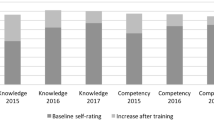Abstract
An estimated 25–40% of the student population on university campuses is grieving a loss that occurred within the past 24 months. This study illustrates the findings of interviews from 20 students about their grief experiences to more deeply understand the unique ways they experience and interact with grief. Three overarching themes were identified, including private grief interactions with non-bereaved peers, private grief interactions with bereaved peers, and counseling grief interactions. Discussion of specific pragmemes of accommodation associated with each interaction is provided and how these discourses uniquely socially construct grief support for emerging adults on college campuses.
Access this chapter
Tax calculation will be finalised at checkout
Purchases are for personal use only
Similar content being viewed by others
References
Actively Moving Forward. (2016). Actively moving forward: About us. http://activelymovingforward.org. Accessed 15 Jan 2016.
Balk, D. E. (1997). Death, bereavement, and college students: A descriptive analysis. Mortality, 2, 207–220.
Balk, D. E. (2008). Grieving: 22–30% of all college students. New Directions for Student Services, 121, 5–14.
Balk, D. E. (2011). Helping the bereaved college student. New York: Springer.
Balk, D. E., Walker, A. C., & Baker, A. (2010). Prevalence and severity of college student bereavement examined in a randomly selected sample. Death Studies, 34, 459–468.
Bernat, J. A., Ronfeldt, H. M., Calhoun, K. S., & Arias, I. (1998). Prevalence of traumatic events and peritraumatic predictors of posttraumatic stress symptoms in a nonclinical sample of college students. Journal of Traumatic Stress, 11, 645–664.
Bonanno, G. A. (2004). Loss, trauma, and human resilience. American Psychologist, 59, 20–28.
Bruan, V., & Clarke, V. (2006). Using thematic analysis in psychology. Qualitative Research in Psychology, 3(2), 77–101.
Capone, A. (2005). Pragmemes (A study with reference to English and Italian). Journal of Pragmatics, 37, 1355–1371.
Capone, A. (2010). On pragmemes again. Dealing with death. La Lingistique, 2(46), 3–21.
Currier, J. M., Holland, J. M., & Neimeyer, R. A. (2006). Sense-making, grief, and the experience of violent loss: Toward a mediational model. Death Studies, 30, 403–428.
DeSpelder, L. A., & Strickland, A. L. (1987). The last dance. Mountain View: Mayfield Publishing Co.
Fajgenbaum, D. J., Chesson, B., & Lanzi, R. B. (2012). Building a network of grief support on college campuses: A national grassroots initiative. Journal of College Student Psychotherapy, 26, 99–120.
Janowiak, S. M., Mei-Tal, R., & Drapkin, R. G. (1995). Living with loss: A group for bereaved college students. Death Studies, 19, 55–63.
Klass, D., & Walter, T. (2001). Processes of grieving: How bonds are continued. In M. R. Stroebe, R. O. Hansson, W. Stroebe, & H. Schut (Eds.), Handbook of bereavement research: Consequences, coping, and care (pp. 431–448). Washington, DC: American Psychological Association.
LaGrand, L. E. (1981). Loss reactions of college students: A descriptive analysis. Death Education, 5(3), 235–248.
LaGrand, L. E. (1985). College student loss and response. New Directions for Student Services, 31, 15–28.
Neimeyer, R. A., Laurie, A., Mehta, T., Hardison, H., & Currier, J. M. (2008). Lessons of love: Meaning-making in bereaved college students. New Directions for Student Services, 121, 27–39.
Paulus, T. M., & Varga, M. A. (2015). “Please know you are not alone with your pain”: Responses to newcomer posts in an online grief support group. Death Studies, 39(10), 633–640.
Prigerson, H. G., Horowitz, M. J., Jacobs, S. C., Parkes, C. M., Aslan, M., Goodkin, K., Raphael, B., Marwit, S. J., Wortman, C., Neimeyer, R. A., Bonanno, G., Block, S. D., Kissane, D., Boelen, P., Maercker, A., Litz, B. T., Johnson, J. G., First, M. B., & Maciejewski, P. K. (2009). Prolonged grief disorder: Psychometric validation of criteria proposed for DSM-V and ICD-11. PLoS Medicine, 6, 1–12.
Schnider, K. R., Elhai, J. D., & Gray, M. J. (2007). Coping style use predicts posttraumatic stress and complicated grief symptom severity among college students reporting a traumatic loss. Journal of Counseling Psychology, 54, 344–350.
Servaty-Seib, H. L., & Taub, D. J. (2010). Bereavement and college students: The role of counseling psychology. The Counseling Psychologist, 38, 947–975.
Smyth, J. M., Hockemeyer, J. R., Heron, K. E., Wonderlich, S. A., & Pennebaker, J. W. (2008). Prevalence, type, disclosure, and severity of adverse life events in college students. Journal of American College Health, 57, 69–76.
Taub, D. J., & Servaty-Seib, H. L. (2008). Developmental and contextual perspectives on bereaved college students. New Directions for Student Services, 121, 15–26.
Varga, M. A. (2015). A quantitative study of graduate student grief experiences. Illness, Crisis, & Loss, 24, 170–186.
Varga, M. A., & Paulus, T. M. (2014). Grieving online: Newcomers’ constructions of grief in an online support group. Death Studies, 38(7), 443–449.
Vickio, C. J., Cavanaugh, J. C., & Attig, T. W. (1990). Perceptions of grief among university students. Death Studies, 14, 231–240.
Walker, A. C., Hathcoat, J. D., & Noppe, I. C. (2012). College student bereavement experience in a Christian university. OMEGA Journal of Death and Dying, 64, 241–259.
Wambach, J. A. (1985). The grief process as a social construct. Omega, 16(3), 201–211.
Author information
Authors and Affiliations
Corresponding author
Editor information
Editors and Affiliations
Rights and permissions
Copyright information
© 2017 Springer International Publishing AG
About this chapter
Cite this chapter
Varga, M.A. (2017). Grief Interactions Among Emerging Adults on College Campuses. In: Parvaresh, V., Capone, A. (eds) The Pragmeme of Accommodation: The Case of Interaction around the Event of Death. Perspectives in Pragmatics, Philosophy & Psychology, vol 13. Springer, Cham. https://doi.org/10.1007/978-3-319-55759-5_5
Download citation
DOI: https://doi.org/10.1007/978-3-319-55759-5_5
Published:
Publisher Name: Springer, Cham
Print ISBN: 978-3-319-55758-8
Online ISBN: 978-3-319-55759-5
eBook Packages: Religion and PhilosophyPhilosophy and Religion (R0)




